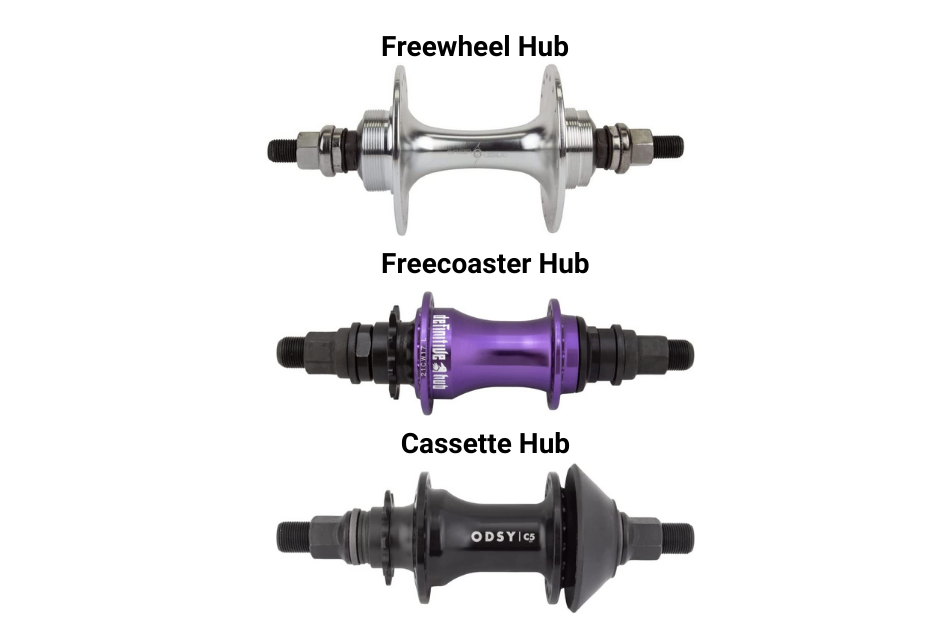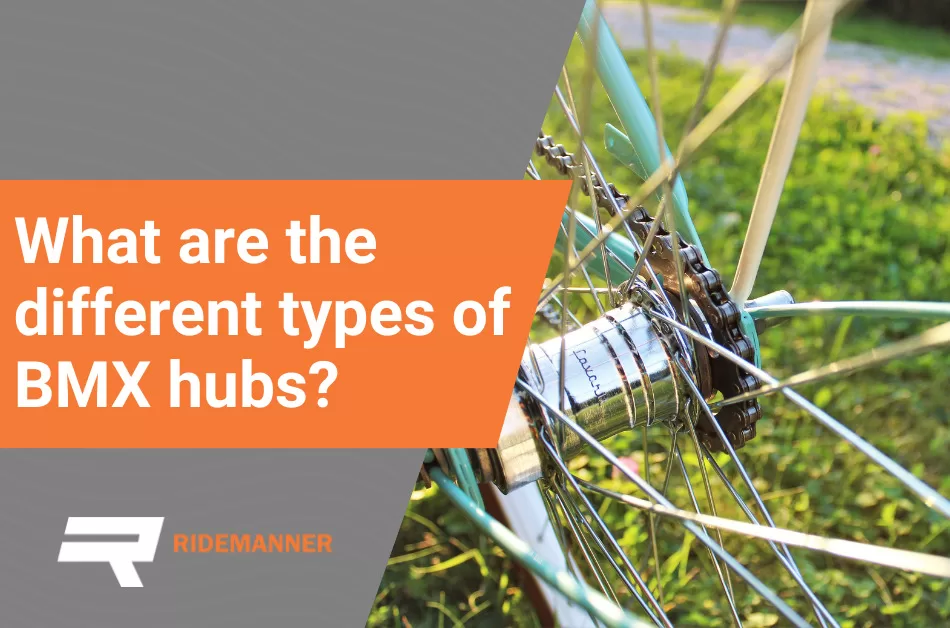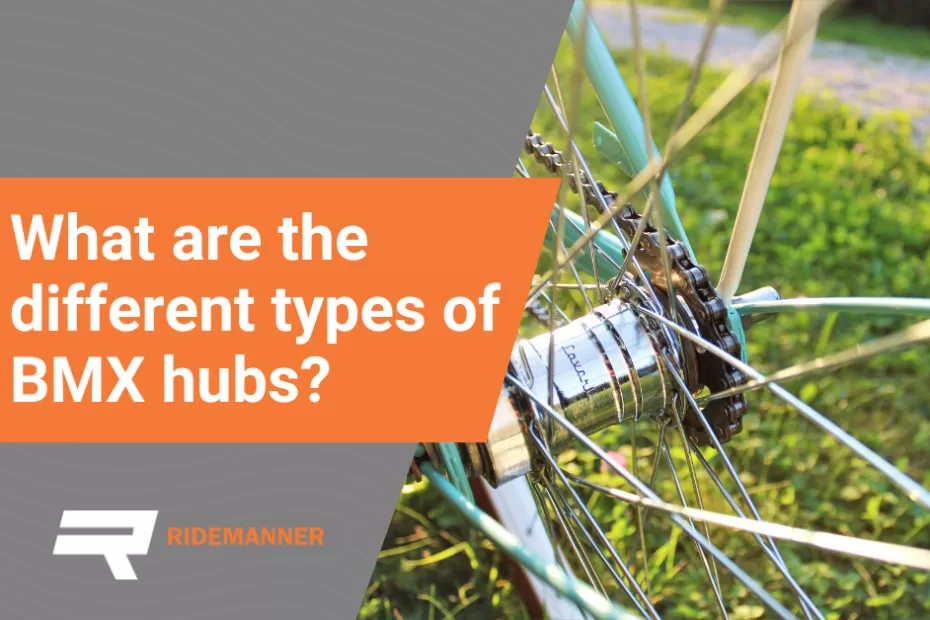Selecting the perfect hub is crucial for your BMX bike’s performance and your overall riding experience. The hub, often considered the heart of your wheel, can significantly impact your bike’s durability, weight, and responsiveness. This comprehensive guide will help you choose the right hub for your riding style, ensuring you get the most out of your BMX adventure.
Table of Contents
Understanding BMX Hubs: The Basics

What is a BMX hub?
A BMX hub is the central component of your bike’s wheel, connecting the spokes to the axle. Hubs transfer power from your pedals to the wheels, enabling you to accelerate, maintain speed, and brake efficiently. The right hub can enhance your bike’s performance, making your rides smoother and more enjoyable.
Why are there different types of BMX hubs?
BMX riders have various riding styles, preferences, and skill levels. Different types of hubs cater to these unique requirements, ensuring optimal performance and satisfaction for each rider. From freewheel hubs for beginners to freecoaster hubs for advanced street riders, there’s a hub to match every style.
Main Categories of BMX Hubs
Freewheel hubs
Freewheel hubs are the simplest and most common type of BMX hub. They feature a ratcheting mechanism that allows you to pedal forward while coasting when you stop pedaling. Freewheel hubs are inexpensive and easy to maintain, making them ideal for beginners. However, they may not offer the same level of performance and durability as other hub types.
Cassette hubs
Cassette hubs are an upgraded version of freewheel hubs, offering improved performance and durability. They feature a separate driver that houses the ratcheting mechanism, making it easier to replace and maintain. Cassette hubs are popular among intermediate and advanced riders, providing quicker engagement and more precise control. On the downside, they are typically more expensive than freewheel hubs.
Freecoaster hubs
Freecoaster hubs allow riders to coast backward without pedaling, opening a world of tricks and maneuvers for street riders. They feature a complex clutch system that disengages the hub when rolling backward. Freecoaster hubs provide a unique riding experience but can be challenging for inexperienced riders. They are also more expensive and require more maintenance than other hub types.
Key Components of BMX Hubs
Hub shell
The hub shell is the outer casing that houses the internal components of the hub. It is typically made of aluminum or steel, with aluminum being lighter and more expensive. The material and construction of the hub shell can impact its durability, weight, and overall performance.
Axle
Axles are the central shafts that connect your hub to your bike’s frame and fork. They come in various types, such as solid or hollow, and have different diameters (3/8-inch or 14mm). The right axle for your riding style depends on your requirements for strength, weight, and compatibility with your bike’s frame and fork. For example, street riders often prefer 14mm axles for added strength, while racers may choose lighter 3/8-inch axles for improved speed.
Bearings
Bearings reduce friction between the hub and axle, allowing your wheels to spin smoothly. There are two main types of bearings: sealed and unsealed. Sealed bearings are enclosed, offering better protection from dirt and moisture, and requiring less maintenance. Unsealed bearings are more affordable but may need more frequent cleaning and lubrication. The type of bearing you choose can impact your hub’s performance, maintenance needs, and lifespan.
Popular BMX Hub Brands
Choosing a reputable BMX hub brand can ensure that you’re getting a high-quality, reliable product. Some popular BMX hub manufacturers include:
- Odyssey
- Profile Racing
- Primo
- Eclat
- G-Sport
- Federal
- Shadow Conspiracy
- BSD
- Demolition
- Cult
Choosing the Right BMX Hub for Your Riding Style
Dirt and trail riding
For dirt and trail riding, cassette hubs are often recommended due to their quick engagement and precise control. Durability and weight are crucial factors, so consider choosing a hub with a robust shell and reliable bearings. A hub with a higher number of engagement points will provide better control over jumps and turns.
Park and ramp riding
Park and ramp riders can benefit from cassette hubs for their responsiveness and control during aerial tricks. A lightweight hub with a sturdy construction is essential for withstanding the impact of landings. Additionally, sealed bearings can help prolong the lifespan of your hub in these demanding conditions.
Street riding
Street riders often prefer freecoaster hubs for their ability to coast backward without pedaling, enabling a range of technical tricks. Strong axles and durable hub shells are crucial for withstanding the impact of grinds and gaps. Sealed bearings can also help reduce maintenance and increase longevity.
Racing
For BMX racing, cassette hubs are favored for their quick engagement and improved acceleration. Lightweight hubs with minimal rolling resistance are essential for optimal speed. Sealed bearings can provide smoother performance and reduced maintenance, helping you focus on your race.
Maintaining Your BMX Hubs
Proper maintenance is key to prolonging the life of your BMX hub. Clean and lubricate your hub regularly, especially if you ride in harsh conditions. Inspect your hub for damage or wear and replace any worn components as needed. If you notice poor engagement, grinding noises, or excessive play in your hub, it may be time for a replacement.
What are the different types of BMX hubs? – Our Final Thoughts
Choosing the right BMX hub involves researching different types, understanding your riding style, and considering factors such as durability, weight, and performance. Don’t be afraid to test different hubs and consult other riders for recommendations. Ultimately, the perfect hub for you will depend on your personal preferences and riding style.
Don’t miss our top 11 BMX hub picks where you will find some of the best hubs available in the market right now.
FAQs about What are the different types of BMX hubs?
Q: Can I switch from a freewheel hub to a cassette hub or vice versa?
A: Yes, you can switch between hub types, but you may need to replace additional components such as your driver, sprocket, or chain to ensure compatibility. Consult your local bike shop or an experienced rider for guidance.
Q: How much do BMX hubs typically cost?
A: BMX hub prices can vary depending on the type, materials, and brand. Freewheel hubs are generally the most affordable, starting around $30, while cassette and freecoaster hubs can range from $80 to $200 or more for high-end models.
Q: Can I upgrade my BMX hub’s bearings?
A: Yes, upgrading your hub’s bearings can improve performance and longevity. If your hub has unsealed bearings, you can replace them with sealed bearings for better protection and smoother operation. Always check the manufacturer’s specifications to ensure you choose the correct bearings for your hub.
Q: Is it possible to convert a freecoaster hub to a cassette hub?
A: While some brands offer conversion kits to change a freecoaster hub to a cassette hub, not all freecoaster hubs can be converted. Before attempting a conversion, check with the hub manufacturer or consult your local bike shop for advice.
Q: What are the signs that my BMX hub needs to be replaced?
A: Some signs that your BMX hub may need replacement include poor engagement, grinding noises, excessive play or wobble, or visible damage to the hub shell, axle, or bearings. Regular maintenance can help extend the life of your hub, but eventually, wear and tear will necessitate a replacement.
Latest Posts

Liam Williams, an esteemed authority in BMX biking, passionately shares his expertise with enthusiasts of all levels. From beginners to pros, he fuels their excitement, offering invaluable knowledge garnered through years of experience. With an authoritative voice, Liam guides riders on their thrilling journey, ensuring they find boundless joy and triumph in the dynamic world of BMX.


